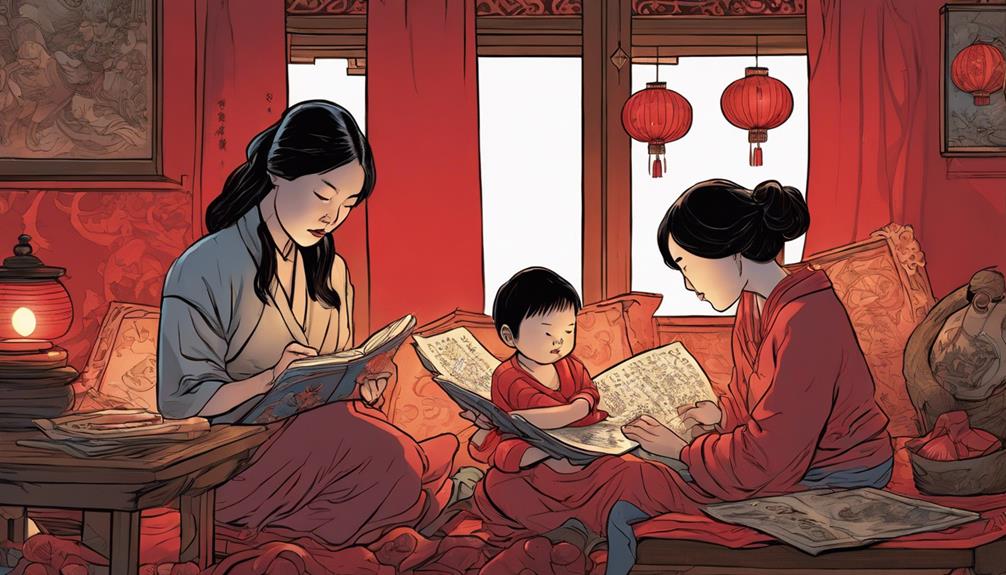Exploring **parenting**! Cultural values shape how moms and dads in America and China raise kids, offering unique ways to teach **independence**, discipline, and school success. American parents cherish **individuality** and self-reliance. In contrast, Chinese parents emphasize **family** and teamwork, rooted in Confucian beliefs. These ideas shape what parents expect, how they discipline, and their involvement level, leading to different social interactions, after-school activities, and school objectives. Unveiling these differences uncovers a rich blend of cultural influences shaping parenting and kids’ lives.
Key Takeaways
• American parents prioritize fostering individual identity and independence, whereas Chinese parents stress family identity and interdependence.
• Chinese parents exert more control and involvement, emphasizing obedience and family identity, whereas American parents encourage independence and self-expression.
• Chinese parents prioritize academic excellence and high expectations, whereas American parents focus on overall well-being and happiness of their children.
• Chinese parenting emphasizes respect for authority figures, whereas American parenting values individuality and encourages questioning authority.
• Cultural values shape parenting practices, with Confucian principles influencing Chinese parenting and individualism influencing American parenting.
Parenting Philosophy and Values
When it comes to parenting philosophy and values, American and Chinese approaches diverge sharply, reflecting fundamentally different beliefs about what matters most in raising children.
You'll notice that American parents prioritize fostering individual identity and independence in their kids, whereas Chinese parents stress family identity and interdependence.
This disparity in cultural values is rooted in the Confucian principles that underpin Chinese parenting, emphasizing filial piety and respect for elders. As a result, Chinese parents instill in their children a sense of indebtedness and obedience without question, a trait not typically found in American parenting.
This dichotomy in parenting style is rooted in the distinct cultural values that shape the way American and Chinese parents raise their kids. By understanding these differences, you can better appreciate the complexities of cross-cultural parenting and the values that drive parental decisions.
Childhood Expectations and Pressures

As you explore the world of childhood expectations, you'll find that Chinese parents pile on the pressure, expecting their kids to ace exams and snag top grades from a tender age, whereas American parents take a more relaxed approach, focusing on nurturing individuality and personal growth.
This stark contrast in childhood expectations is a fundamental aspect of the cultural differences between American and Chinese parenting practices. Chinese parents often place significant pressure on their children to uphold family honor and achieve societal expectations, whereas American parents prioritize their children's happiness, well-being, and personal development over strict academic or societal pressures.
These differing expectations shape children's upbringing and future paths, influencing the values and skills they develop. By understanding these cultural differences in childhood expectations, you can better appreciate the unique approaches to parenting in American and Chinese cultures.
Role of Family and Elders

In Chinese families, elders wield significant influence over parenting decisions, offering guidance rooted in cultural respect for the older generation that can shape your child's upbringing.
This emphasis on family identity is a stark contrast to American parenting, which tends to focus more on individual identity.
As a parent, you'll find that cultural values such as filial piety and obedience are deeply ingrained in Chinese parenting. Your child will be taught to respect and obey elders without question, fostering a sense of indebtedness that shapes their upbringing.
This is influenced by Confucian teachings and cultural norms that prioritize family harmony and respect for authority.
As Sheryl Takagi Silzer, a multicultural consultant, notes, understanding these cultural differences is essential in bridging the gap between parenting styles. By acknowledging the role of family and elders in Chinese parenting, you'll gain a deeper appreciation for the cultural values that shape your child's development.
Discipline and Obedience Styles

You'll notice a significant difference in how discipline and obedience are approached in Chinese and American parenting, with Chinese parents often relying on strict rules and consequences to enforce obedience, while American parents may take a more collaborative approach.
This disparity stems from fundamental cultural values: Chinese parenting emphasizes obedience and respect for authority figures, whereas American parenting values individuality and encourages children to question authority.
In Chinese parenting, discipline often involves strict rules and consequences, with parents expecting immediate compliance from their children. In contrast, American parents may use reasoning and negotiation as disciplinary tactics.
This authoritarian parenting style in Chinese culture is rooted in the emphasis on respect for authority and social hierarchy. On the other hand, American parenting focuses on fostering independence and autonomy.
Understanding these differences in discipline and obedience styles can provide valuable insights into the cultural values that shape parenting practices.
Independence and Self-Expression

As you explore the differences between American and Chinese parenting styles, you'll notice that independence and self-expression are valued differently in each culture.
In American parenting, you're encouraged to express yourself freely and make choices based on personal preferences, fostering a strong sense of autonomy from a young age.
In contrast, Chinese parenting emphasizes respect for authority and societal expectations, prioritizing family harmony and obedience over individual self-expression.
Personal Freedom Expected
By allowing children to express themselves freely, American parents foster an environment that celebrates individuality and autonomy from a young age. You, as a parent, encourage your child to make choices that reflect their personal preferences, promoting independence and self-expression. This emphasis on personal freedom is a hallmark of American parenting, where children are taught to think for themselves and develop their own identities.
In contrast, Chinese parenting tends to prioritize family identity over individual freedom, instilling values of respect and obedience within the family unit. While you may value your child's autonomy, Chinese parents often prioritize family harmony and societal expectations. This fundamental difference in approach shapes the way children develop and understand their place within their families and communities.
Conformity Vs Individuality
In the contrast between American and Chinese parenting, one of the most striking differences lies in the emphasis on conformity versus individuality, with Chinese parents often expecting their children to conform to social norms and respect authority without question, whereas American parents encourage their kids to express themselves freely and develop their own identities.
You might notice that Chinese parents prioritize conformity, teaching their children to adhere to societal expectations and respect authority without questioning. This emphasis on obedience is deeply rooted in Confucian teachings, which stress the importance of respecting authority figures.
In contrast, American parents foster independence and self-expression, encouraging their kids to develop their own unique identities and make decisions based on personal values and beliefs.
This difference in approach has a profound impact on the way children develop. Chinese children are taught to prioritize family identity and filial piety, whereas American children are encouraged to develop a sense of self-worth based on individual achievements and personal growth.
As you navigate these cultural differences, consider how these distinct approaches shape the values and identities of the next generation.
Autonomy in Childhood
You'll notice that the emphasis on conformity versus individuality has a direct impact on the level of autonomy children experience in their daily lives, with Chinese parents often limiting independence and self-expression in favor of respect for authority and societal norms.
This difference in approach is rooted in cultural values, with American parents encouraging independence and self-expression from a young age, whereas Chinese parents prioritize respect for authority and conformity to family and societal expectations. As a result, Chinese children are often expected to conform to norms, restricting their autonomy, whereas American children are encouraged to explore their individuality and make choices, fostering autonomy.
This disparity in autonomy is a direct reflection of the cultural values that shape parenting practices in each society. While Chinese parents prioritize respect for authority, American parents prioritize independence and self-expression, leading to distinct levels of autonomy in childhood. Understanding these differences in cultural values and parenting practices can provide valuable insights into the development of autonomy in children.
Academic Achievement Goals

As you explore the differences in academic achievement goals between American and Chinese parenting styles, you'll notice that Chinese parents often push for excellence, setting high expectations for their children's academic performance. In contrast, American parents may prioritize their child's happiness and overall well-being over strict academic achievement goals.
Now, let's examine the implications of these differing approaches, particularly when it comes to pushing for excellence, having high expectations, and prioritizing grades over happiness.
Push for Excellence
While pursuing academic excellence, Chinese parents set the bar high, often pushing their children to excel in school and prioritizing education as a key determinant of success. You'll notice that Chinese parents prioritize academic achievement, emphasizing rigorous discipline to guarantee their children's success.
This push for excellence reflects cultural values of hard work, perseverance, and societal success. In contrast, American parents tend to take a more balanced approach, emphasizing personal growth and development alongside academic achievement.
Chinese parents, on the other hand, set rigorous academic goals, prioritizing success in education as a key measure of achievement. This emphasis on academic excellence is deeply ingrained in Chinese culture, where education is seen as a key factor in securing a successful future.
High Expectations Only
One key aspect of Chinese parenting is setting high expectations for academic achievement, with parents often expecting their children to excel in school and reach the top of their class.
You may notice that Chinese parents prioritize academic success above other aspects of their children's lives. This emphasis on high expectations is deeply rooted in Chinese culture, where education is seen as a key to success and social mobility.
In contrast, American parents tend to take a more holistic approach, balancing academic achievement with personal growth, social skills, and emotional intelligence. This cultural difference in parenting approaches is significant, as it shapes the way children are raised and their academic achievement goals are set.
While Chinese parents' high expectations can lead to pressure and stress for children, American parents' focus on well-rounded development may lead to a more relaxed attitude towards academic achievement. Understanding these differences is essential in recognizing the diverse values and priorities that underlie parenting styles in different cultures.
Grades Over Happiness
Prioritizing your child's happiness over their academic achievement or believing that good grades are the ultimate measure of success is crucial. This is a fundamental question that highlights the cultural differences in parenting goals between American and Chinese parents.
In Chinese culture, academic achievement is often given greater importance than emotional well-being, with parents pushing their children to excel academically to meet societal expectations. In contrast, American parents tend to stress happiness and emotional development over academic success, focusing on their children's personal growth rather than just academic performance.
These differing parental expectations can have a profound impact on children's attitudes towards success and happiness. While Chinese children may see good grades as the key to success, American children may prioritize emotional fulfillment and personal satisfaction.
These cultural differences in parenting goals can shape the way children approach challenges, set goals, and define success. As a parent, it's vital to reflect on your values and priorities, considering whether you're emphasizing academic achievement at the expense of emotional well-being or vice versa.
Socialization and Extracurricular

In the domain of socialization and extracurricular activities, American parents often prioritize fostering individuality and social skills through playdates and group activities, whereas Chinese parents focus on structured pursuits to instill discipline and respect for authority.
You may find that American parents encourage you to explore your personal interests and develop independence through extracurricular choices, such as joining a sports team or club that aligns with your passions. On the other hand, Chinese parents tend to prioritize academic success and skill-building through activities like music lessons, sports, and tutoring.
This emphasis on structured activities is rooted in the cultural expectation that extracurricular pursuits should be purposeful and productive. In contrast, American parents view socialization and extracurricular activities as opportunities for children to develop social skills, build relationships, and have fun.
As a result, American children may have more freedom to choose their own extracurricular activities, whereas Chinese children may have their activities chosen for them. These differing approaches reflect fundamental differences in values and priorities between American and Chinese parenting styles.
Parental Involvement and Control

As you explore the role of parents in shaping their children's lives, you'll find that American parents often take a step back to encourage independence, whereas Chinese parents tend to take a more hands-on approach, exerting greater control over their children's choices and actions.
This contrast in parental involvement and control is rooted in fundamentally different values. American parents prioritize fostering individuality and independence in their children, while Chinese parents emphasize family identity and interdependence. The latter approach often involves higher levels of parental control, which is reinforced by Confucian values that stress filial piety and obedience to elders.
In Chinese culture, children are taught a sense of indebtedness to their parents and are expected to obey without question. This level of parental control can be seen in the way Chinese parents closely monitor their children's academic performance, social relationships, and even career choices.
In contrast, American parents tend to give their children more autonomy, encouraging them to make their own decisions and learn from their mistakes.
Cultural Identity and Tradition

As you explore the domain of cultural identity and tradition, you'll notice that preserving heritage values and honoring ancestors' ways are essential components of Chinese parenting. This emphasis on cultural preservation is rooted in Confucian principles, which stress the importance of filial piety and respect for one's ancestors.
Preserving Heritage Values
You're likely to observe a stark difference in how American and Chinese parents approach preserving heritage values, with Chinese parents placing a strong emphasis on cultural identity and tradition. This emphasis is deeply rooted in Confucian teachings, which shape Chinese parenting practices and stress family identity and obligation. In contrast, American parenting focuses on fostering individual identity and independence in children.
| Aspect | American Parenting | Chinese Parenting |
|---|---|---|
| Focus | Individual identity and independence | Family identity and obligation |
| Cultural Emphasis | Fostering individuality | Preserving cultural heritage values |
| Values | Independence, self-reliance | Filial piety, respect for elders |
| Parent-Child Relationship | Encourages independence | Emphasizes interdependence |
| Cultural Identity | Focus on personal identity | Strong emphasis on cultural identity |
Chinese parents prioritize preserving heritage values, such as filial piety and respect for elders, which are essential to their cultural identity. In contrast, American parents prioritize fostering individual identity and independence in their children. Sheryl Takagi Silzer, a third-generation Japanese American, offers workshops on cultural self-discovery and multicultural consulting, highlighting the importance of preserving heritage values in modern parenting.
Honoring Ancestors' Ways
In Chinese culture, honoring ancestors' ways is an essential aspect of parenting. Parents actively pass down customs, values, and beliefs from their lineage to the next generation. You, as a parent, understand the significance of ancestral veneration in shaping your child's cultural identity and tradition.
By embracing your heritage, you're not only preserving your family's legacy but also instilling a sense of respect for your lineage in your child. Traditional Chinese parenting practices involve integrating ancestral traditions into daily routines and child-rearing practices, ensuring that the next generation appreciates their roots.
Ancestor worship plays a significant role in shaping Chinese parenting philosophies and family dynamics, emphasizing the importance of honoring one's heritage. By doing so, you're passing down the values, beliefs, and customs that have been passed down to you from your ancestors, ensuring the continuation of your family's cultural identity.
Parent-Child Relationship Dynamics

Your relationships with your parents are deeply rooted in the cultural values of your upbringing, and in the case of Chinese parenting, this means a strong emphasis on filial piety and obedience. This cultural dynamic is shaped by Confucian teachings, which prioritize family identity and interdependence over individual autonomy. In contrast, American parenting values individuality and self-expression, often leading to a more egalitarian parent-child relationship.
| Parenting Style | Parent-Child Relationship | Emphasis |
|---|---|---|
| Chinese | Hierarchical, obedient | Family identity, interdependence |
| American | Egalitarian, autonomous | Individuality, self-expression |
| Chinese | Filial piety, respect | Family loyalty, obedience |
| American | Mutual respect, open communication | Personal freedom, autonomy |
In Chinese parenting, children are taught to prioritize family relationships over individual desires, reflecting the importance of family identity. This leads to a parent-child relationship characterized by hierarchical structures, where children are expected to honor and obey their parents. In contrast, American parenting fosters individual autonomy, encouraging children to develop their own identities and make independent decisions. Understanding these differences in parent-child relationship dynamics can provide valuable insights into the cultural values and practices that shape our upbringing.
Frequently Asked Questions
What Is the Difference Between Chinese and American Parenting Styles?
You'll notice that Chinese and American parenting styles differ greatly. Chinese parents prioritize interdependence, emphasizing their children's achievements as a reflection of their own self-worth.
In contrast, American parents focus on fostering independence and individuality, valuing their children's intrinsic worth regardless of accomplishments. This fundamental distinction shapes their parenting approaches, with Chinese parents often exhibiting more controlling behaviors.
What Are the Differences Between Chinese Culture and American Culture?
You'll notice that Chinese culture prioritizes interdependence, emphasizing societal expectations and respect for elders, whereas American culture values independence and individuality.
Chinese culture is deeply rooted in Confucianism, which stresses filial piety and obedience, whereas American culture focuses on fostering autonomy and individual identity.
These fundamental differences shape the distinct values, family dynamics, and parenting practices in each culture, influencing how individuals perceive their role in society.
What Is the Parenting Culture in China?
As you explore the world of Chinese parenting, you might wonder: what's behind the emphasis on academic achievement?
In China, parenting culture is deeply rooted in Confucian teachings, emphasizing respect, obedience, and family unity. You'll find that parents often prioritize the family unit over individual identity, seeking guidance from elders and relying on extended family support.
This collective approach shapes their parenting practices, which may include hiring postpartum nannies and valuing the wisdom of older generations.
What Are Some Cultural Differences in Parenting Styles?
As you explore parenting styles, you'll notice significant cultural differences. In individualistic cultures like the US, parenting emphasizes autonomy and independence, fostering self-expression and decision-making skills.
Conversely, collectivist cultures like China prioritize family harmony and obedience, with parents expecting children to prioritize family needs over personal desires. These fundamental differences shape parenting approaches, influencing how children develop and interact with their families and communities.
What are the key differences between American and Chinese parenting styles?
When it comes to asian vs western parenting styles, there are several key differences between American and Chinese approaches. American parents tend to emphasize individuality and self-expression, while Chinese parents often prioritize discipline and academic success. These differences stem from cultural differences in values and beliefs about child-rearing.
Conclusion
Understanding the stark contrasts between American and Chinese parenting is crucial. American parents prioritize independence and self-expression, while Chinese parents emphasize discipline and obedience. Cultural values shape parenting styles, highlighting the unique strengths and weaknesses of each approach.
By recognizing these differences, we can foster a deeper appreciation for the diverse ways in which cultures nurture their children.











